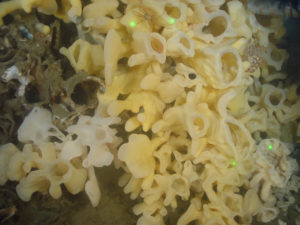For interview, please contact:
Ross Jameson, Ocean Conservation Manager
Canadian Parks and Wilderness Society-British Columbia
778-953-2372
ross@cpawsbc.org
New research prompts call for urgent protection of BC’s glass sponge reefs
For Immediate Release
June 26, 2020
Unceded Coast Salish Territory/Vancouver, BC – A new study led by Angela Stevenson at the University of British Columbia indicates that ongoing climate change is a serious and immediate threat to BC’s ancient glass sponge reefs. The Canadian Parks and Wilderness Society – British Columbia (CPAWS-BC) calls for the urgent establishment of marine protected areas (MPAs) for glass sponge reefs in BC.
Glass sponge reef ecosystems shelter rockfish and prawns and are efficient filter feeders. Healthy glass sponge reef marine protected areas can filter out up to 90% of bacteria from ocean water and work to keep carbon locked in the seafloor.
Fisheries and Oceans Canada (DFO), along with the Marine Life Sanctuaries Society (MLSS), recently verified five new living glass sponge reefs and one dead reef during scientific surveys in Howe Sound. These reefs need urgent protection if they are to adapt and survive against threats from climate change and human activity.
“Marine protected areas will not only protect glass sponge reefs from physical damage caused by bottom-contact fishing, they will also act as natural climate solutions,” says Ross Jameson, Ocean Conservation Manager for CPAWS-BC. MPAs offer long term protection, prevent further damage and absorb carbon to help beat back climate change.
For two decades, CPAWS-BC has worked to establish stronger protection for BC’s known glass sponge reefs. In 2017, Hecate Strait/Queen Charlotte Sound Glass Sponge Reefs Marine Protected Area protected over 2000 km2 of glass sponge reefs off BC’s north and central coast. 17 fisheries closures protect reefs in Howe Sound and the Strait of Georgia. Unprotected glass sponge reefs in Howe Sound and Chatham Sound need urgent attention.
This new study underscores the pressure glass sponges face to adapt quickly to survive in a changing ocean. Protecting these unique biological treasures will not only safeguard economically important marine life, but also ensure the reefs can remain a source of awe and wonder for generations to come.
-30-
For interview, please contact:
Ross Jameson, Ocean Conservation Manager
Canadian Parks and Wilderness Society-British Columbia
778-953-2372
ross@cpawsbc.org
Resources
We would like to recognize the many other organizations who have worked tirelessly to conserve this unique habitat: Marine Life Sanctuaries Society, David Suzuki Foundation, Coastal Ocean Research Institute, Subsea Society of Howe Sound, Canadian Marine Environment Protection Society, and Sunshine Coast Conservation Society.
Stevenson, A., Archer, S.K., Schultz, J.A. et al. Warming and acidification threaten glass sponge Aphrocallistes vastus pumping and reef formation. Sci Rep 10, 8176 (2020). https://doi.org/10.1038/s41598-020-65220-9

About CPAWS-BC:
Canadian Parks and Wilderness Society – British Columbia Chapter (CPAWS-BC) protects wilderness in every corner of BC and deep into the ocean. CPAWS-BC supports the creation of large, well-managed, connected protected areas where native plants and animals thrive, now and forever; and where people and communities can live off the land and ocean without impacting the ability of future generations to do the same.
In the past 50+ years, CPAWS has played a lead role in protecting over half a million square kilometres – an area bigger than New Brunswick, Newfoundland and Labrador put together.
